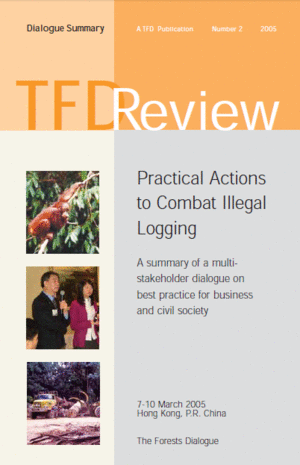TFD Review: Practical Actions to Combat Illegal Logging
From March 7-10, 2005, more than 120 leaders from business, civil society,
government and academia met in Hong Kong to explore collaborative
strategies for combating illegal logging in Asia and throughout the world.
This meeting was convened by The Forests Dialogue (TFD), an international
organization which provides a forum for multi-stakeholder dialogues on
sustainable forestry issues.
The Dialogue included presentations and case studies on current efforts by
businesses, environmental and social non-governmental organizations
(NGOs), and government representatives to address illegal logging. These
presentations highlighted many factors that contribute to illegal logging,
including weak governance, corruption, poor law enforcement, inadequate
public lands management, social conflict, unclear property rights, failure to
recognize local community needs and rights, and uneven levels of
commitment from the business community. Participants agreed that
governments, companies and NGOs share responsibility for addressing the
challenges of illegal logging.
Participants agreed that business and civil society should foster the
following actions:
· Continue to strengthen and promote important existing alliances to
combat illegal logging.
· Work in partnerships to develop uniform, auditable, practical
national legality standards, especially in countries with a high risk of
illegal logging.
· Create a simple, credible, independent and objective ratings system
that can be utilized to identify high-risk countries and tree species,
and possibly expanded to cover companies.
· Encourage companies to use innovative wood tracking technologies,
and to implement best practices to ensure that illegally sourced,
harvested or traded wood does not enter their supply chains.
Participants agreed on the following actions to promote increased governmental
commitment:
· Encourage strengthening of laws that protect forests and local
communities that depend on forests. Strengthen law enforcement in
both exporting and importing countries.
· Encourage public procurement policies and voluntary partnerships
with exporting countries to reduce illegal wood imports. Promote
regional collaborative initiatives on forest law enforcement and
governance.
· Urge increased commitment on the issue of illegal logging at intergovernmental
meetings and with top officials in key capitals in Asia,
Europe, and beyond.
· Strengthen existing partnerships with industry and civil society.

